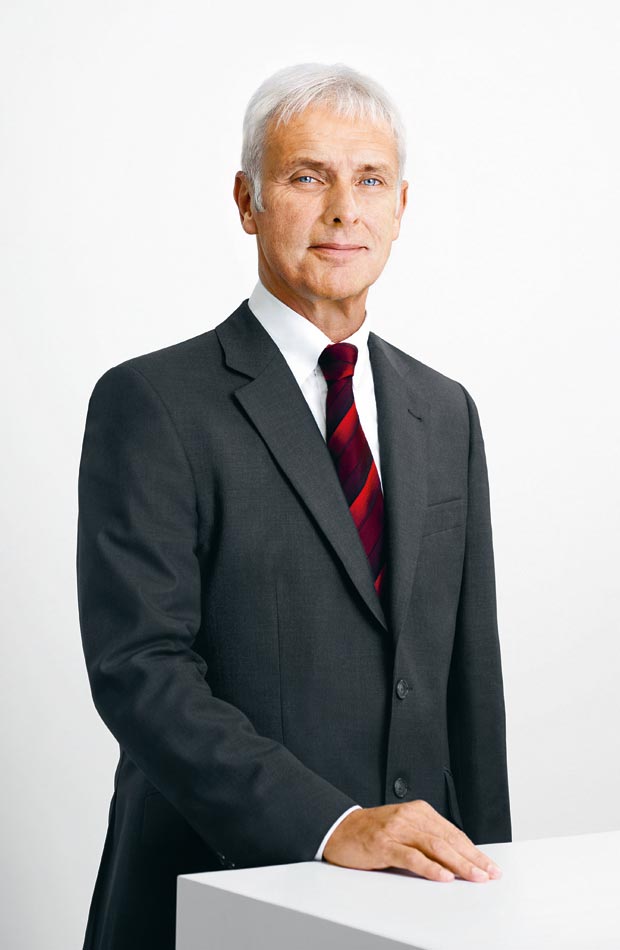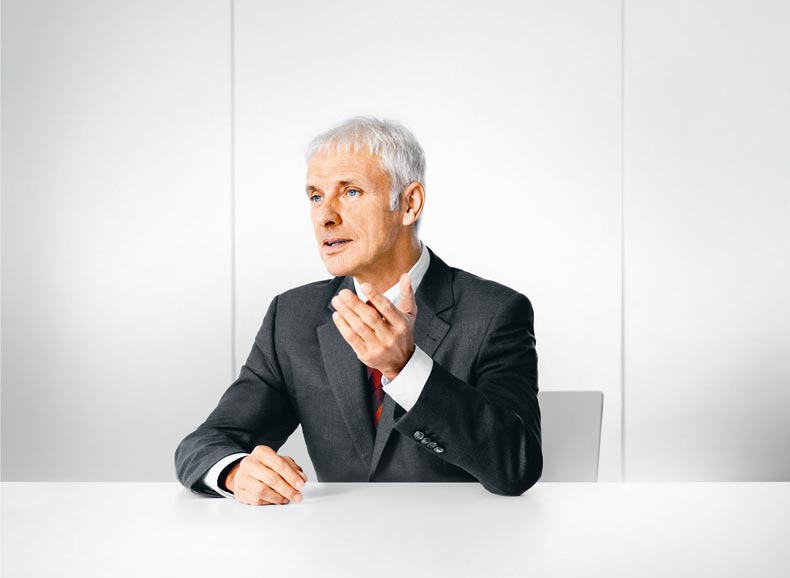Restoring confidence

Matthias Müller (62) has been CEO of Volkswagen AG since the end of September 2015. He talks about trust, his notion of leadership, and about the future of the Group.
Text: Johannes Winterhagen ___
Fotografie: Hartmut Nägele

Mr. Müller, what does trust mean for you personally? Everything is based on trust, as much in our private lives as in the world of business. In connection with the Diesel issue at Volkswagen rules were broken and ethical boundaries overstepped. As a result, we disappointed many people and forfeited trust – among customers, investors and employees as well as with the political community and the public. So our goal now is to win back that trust. And I also see that as my most important task.
How can you succeed in regaining trust? You can build trust by acknowledging your mistake and demonstrating your firm resolve to fix things – not just the consequences, but also the underlying causes. In our case that includes convincing technical solutions for our customers just as much as the relentless clarification of what happened. Looking towards
the future, it is vital that we learn from mistakes and draw the right conclusions, so that nothing like this can ever happen again at Volkswagen.
What specific steps are called for to make sure an error of such magnitude does not happen again? We must analyze all relevant workflows, identify the weak points and eradicate them. We are going to great lengths to do precisely that. And we are also working on our error management culture. Mistakes are a fact of life. It must be possible to talk openly about problems, at all hierarchy levels. What is crucial, though, is that we are willing to learn from that.
You have emphasized on several occasions that Volkswagen will not allow itself to be paralyzed by the crisis. What do you mean by that? We need to safeguard Volkswagen’s future viability in a world facing fundamental change. We were extremely successful for many years. For that success to continue under changed circumstances we need to realign the Group: our structures, our mindset and our actions – in other words, what is commonly known as our “corporate culture” – as well as in terms of our strategic goals for the future. We are making progress in all of these areas. In that sense, you could say the crisis has opened doors.
You just raised the subject of culture. What is your notion of good leadership? First and foremost open communication, readiness to accept responsibility, and a bold entrepreneurial spirit. We may have been remiss in fostering this attitude in the past. Of course, in a company of our size, a fundamental change in leadership style will not happen overnight. You cannot stand at the factory gate with a megaphone in your hand and proclaim a new culture. The crucial point is that we as the Board of Management live up to the new form of cooperation, day in, day out.
What does that mean for you personally? Before I make a decision, I talk to the employees who are best able to give me the facts and information I need – regardless of where they stand in the hierarchy. And I listen very carefully, especially when opinions differ from my own.
The brands are to be given greater independence in future. How will you nevertheless be able to leverage technical synergies in the Group? During my time at Porsche we enjoyed a large measure of freedom and achieved very good results. This independence and autonomy will do all the brands good. We will leverage synergies by bundling key functions in the Group Board of Management. That applies, for instance, to brand and product strategy or to the major technologies of the future. We set the framework, and the individual brand groups have the greatest possible autonomy for action within that framework. That is how we can make the Group more efficient, faster and more flexible as well as harnessing its immense potential even more effectively in future.
You are also strengthening the regions. So where will Wolfsburg actually have a say in future? At headquarters, we define the regions where we see particularly good growth opportunities and determine which brands will develop these openings. But the actual implementation should be decentralized, because local markets know customers’ requirements best. That, too, is a question of trust.
What are you doing to get Volkswagen back on the road to success? Obviously, our top priority is solving the emissions issue in the best interests of our customers. At the same time, we must develop ideas as to where the Group and the individual brands are headed in the long term. That is why we are working hard on a “Strategy 2025”.
What is special about this new strategy? Overall, “Strategy 2018” was very successful, which is why we do not have to throw everything overboard. The new strategy is about taking the next bold step, putting greater emphasis on elements such as digitalization, electro-mobility and a proactive approach to sustainability. These are the issues that determine the future, so they have to be right at the top of our agenda. I feel it is important that the new strategy is not devised by a few people sitting in an ivory tower, but is created in an open and structured process.
Can a traditional car maker set trends in digitalization? That must be our mission. Our customers expect us to connect their vehicles with their digital world. And we do not want to leave that to players from outside our industry. Quite the reverse: one of our fundamental tasks is to develop new services and business models that relate to every aspect of our core product – the car. In order to do that, we will be building up or expanding the necessary know-how in-house as well as opening up more to cooperation initiatives.
„We need to safeguard Volkswagen’s future viability in a world facing fundamental change.“
___ Matthias Müller, Chairman of the Board of Management of Volkswagen Aktiengesellschaft

Electro-mobility is one strategic focus: when will the electric car be ready for the mass market? The Volkswagen Group has invested many millions in developing electric vehicles. The upshot of that investment is a range of very attractive electric cars and plug-in hybrids. We will be launching more than 20 further models by 2020. By the end of this decade, a new battery technology that will allow us to offer vehicles with a range of 500 kilometers will be avail-able. But that alone will not be sufficient. At the same time, for instance, an extensive charging infrastructure, especially on highways, must also be put in place. Our industry advocates that.
Looking to the future, what role will size play for Volkswagen? Size in terms of how many vehicles you sell is not an end in itself. We prefer to concentrate on value-added growth. We want to generate a financial performance that provides us with adequate means to make bold, sustainable investments in the future. That is the only way we can safeguard lasting success in a changing automotive world.
Where will Volkswagen stand in 2025? I am optimistic we will become one of the world’s leading partners for mobility. Both in passenger and freight transport, in urban as well as long-distance travel. This calls for the development of new intermodal transport concepts. That is the only way to improve traffic flows and reduce the environmental impact in metropolises. An exciting new world of mobility will emerge over the coming years. Our mission is to proactively participate in shaping it.